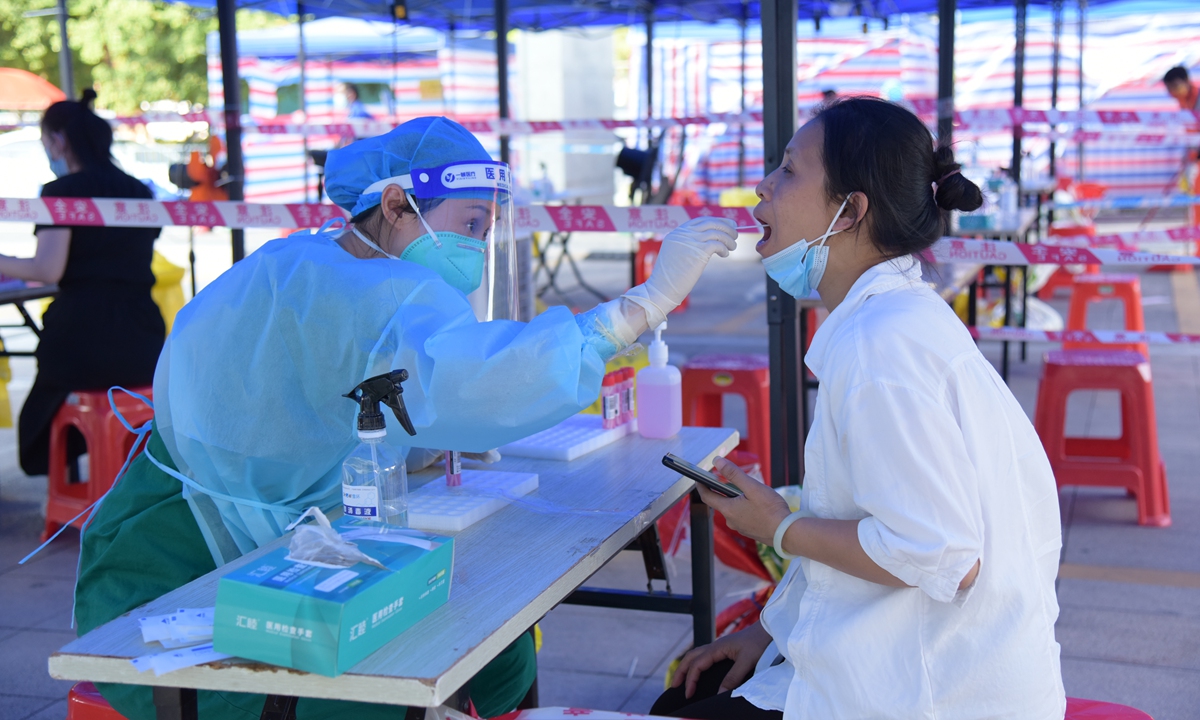
A resident receives nucleic acid test in a residential community in Dongguan, South China's Guangdong Province, on September 15, 2022. Photo: IC
Chinese health officials reiterated adherence to the dynamic zero-COVID strategy amid severe epidemic risks at a press conference on Saturday. In response to the problem of excessive and one-size-fits-all epidemic prevention and control measures in some parts of the country during recent flare-ups, officials urged serious rectification and vowed to hold those who fail to implement full rectifications accountable according to the law.
During the Saturday press conference held in Beijing, Mi Feng, a spokesperson for the National Health Commission, stressed that China will continue to maintain its dynamic zero-COVID strategy as the country still faces the dual risks of imported cases and domestic community transmission.
The epidemic prevention and control situation remains severe, Mi noted.
According to the National Health Commission's website, a total of 657 confirmed cases and 3,180 asymptomatic cases were reported in China on Friday, with existing confirmed cases in China reaching 6,003 as of that day.
Outbreaks have occurred in Chinese cities including Urumqi, Hohhot, Guangzhou, Zhengzhou, Fuzhou and Lanzhou.
Authorities in Haizhu district, Guangzhou, required local residents to avoid leaving home unless necessary for three days starting from Saturday.
Amid the fresh flare-ups, problems of excessive and one-size-fits-all anti-epidemic measures in some parts of the country have been exposed, triggering heated discussion on social media platforms.
Tuo Jia, an official with the National Administration of Disease Prevention and Control, listed some typical improper anti-epidemic practices complained by the public and vowed to seriously rectify inappropriate measures.
Such improper practices mainly include forcing people traveling from low-risk areas to return or placing them under quarantine, expanding travel restrictions to regions seeing no risk of the virus's spread, and broadening ranges of at-risk personnel. They have been observed in a number of cities including those in Northeast China's Heilongjiang Province, North China's Shanxi Province, Central China's Henan Province, and South China's Guangdong Province.
These practices violate the spirit of scientific, accurate and high-efficient epidemic prevention and control. They are serious problems of formalism and bureaucratism, Tuo said. She noted that China will increase scientific epidemic control and prevention levels, firmly rectifying excessive policy steps and hold those who fail to implement full rectifications accountable according to the law.
Some recent media reports said that several railway stations in cities in South China's Guangxi Zhuang Autonomous Region had stopped requiring passengers to show negative nucleic acid testing results before boarding trains. It's also reported that cities including Yibin in Southwest China's Sichuan Province and Yueyang in Central China's Hunan Province had begun charging the public for nucleic acid testing, with only certain groups exempted.
These moves had led to speculations as to whether local Chinese authorities were relaxing requirements for nucleic acid testing, a signal that China is gradually easing normalized anti-epidemic measures.
In response, Hu Xiang, another official from the national epidemic prevention and control authority, said during the Saturday press conference that China will adhere to its dynamic zero-COVID strategy unswervingly, while continually optimizing its anti-epidemic measures according to the changes of the virus' incubation, transmissibility and pathogenicity.
Global Times




